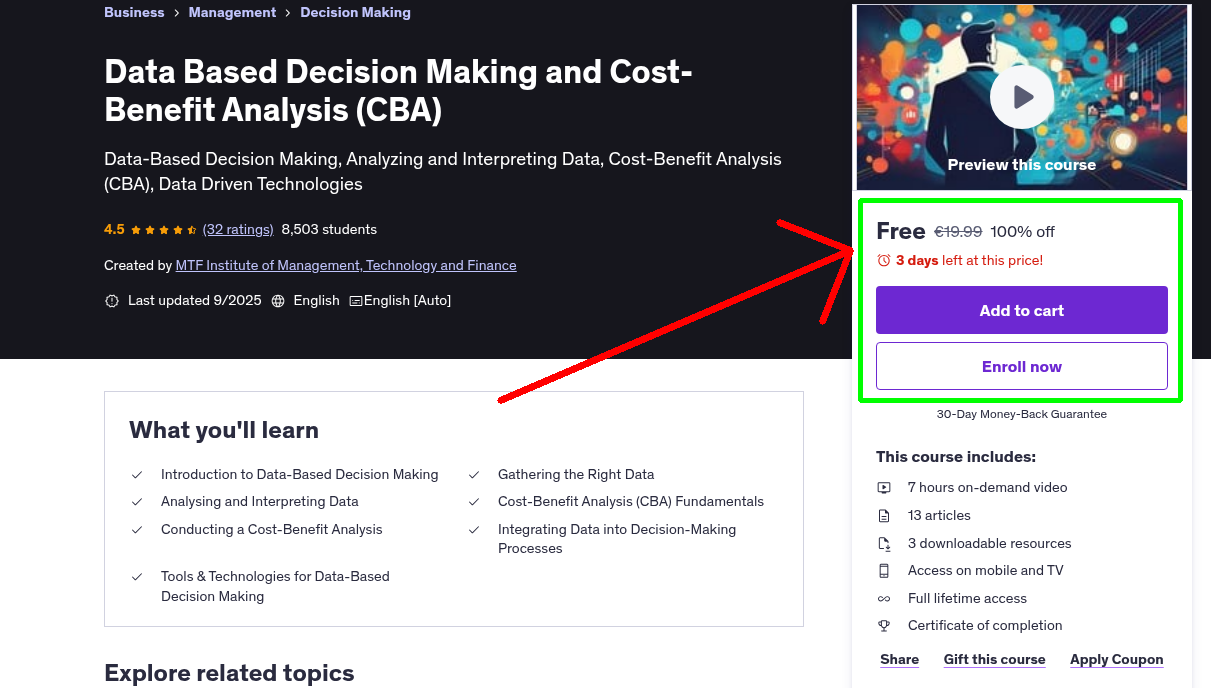
What You'll Learn
- Introduction to Data-Based Decision Making
- Gathering the Right Data
- Analysing and Interpreting Data
- Cost-Benefit Analysis (CBA) Fundamentals
- Conducting a Cost-Benefit Analysis
- Integrating Data into Decision-Making Processes
- Tools & Technologies for Data-Based Decision Making
Requirements
- For a better learning experience, we suggest you to use a laptop / mobile phone / pen and paper for taking notes, highlighting important points, and making summaries to reinforce your learning.
Who This Course is For
- No special requirements. A course for anyone who wants to build career in management and business
- What is Data-Based Decision Making? Using data to guide business choices instead of intuition. Involves collecting, analysing, and interpreting data. Enhances accuracy, efficiency, and strategic planning. Applied across industries: marketing, finance, operations, etc.
- Why Data Matters in Management Enables evidence-based decision-making. Reduces risks and uncertainty. Improves efficiency and resource allocation. Supports performance measurement and growth strategies.
- The Role of Data in Strategic Leadership Informs long-term business goals and planning. Helps leaders anticipate market trends and risks. Enhances competitive advantage through insights. Strengthens accountability and performance evaluation.
- Key Benefits & Challenges of Data-Driven Decision Making Benefits: Increases accuracy and efficiency. Identifies trends and opportunities. Enhances customer insights and personalisation. Challenges: Data overload and complexity. Requires proper tools and expertise. Ethical and privacy concerns in data usage.
- Importance for Companies: Improved Decision Making: Data-based decision making replaces gut feelings and assumptions with concrete evidence. By analyzing data, companies can identify trends, patterns, and insights that lead to more informed and effective decisions. This reduces risks and increases the likelihood of positive outcomes. Enhanced Efficiency and Productivity: CBA helps companies evaluate the costs and benefits of different projects, initiatives, or strategies. This ensures that resources are allocated efficiently and that investments are made in areas that provide the greatest return. By optimizing resource allocation, companies can improve productivity and profitability. Competitive Advantage: Companies that effectively utilize data and CBA gain a competitive edge. They can identify market opportunities, understand customer preferences, and develop innovative products or services that meet market demands. This allows them to stay ahead of the competition and capture a larger market share. Risk Management: Data analysis helps companies identify potential risks and challenges. By understanding the factors that can impact their operations, they can develop strategies to mitigate risks and minimize negative consequences. This ensures business continuity and resilience. Innovation and Growth: Data-driven insights can spark innovation and drive business growth. By analyzing customer feedback, market trends, and emerging technologies, companies can identify new opportunities for product development, market expansion, or process improvement. This fosters a culture of innovation and enables sustainable growth.
- upport in Building a Career for Managers and Experts: Increased Employability: Managers and experts with expertise in data-based decision making and CBA are in high demand across industries. These skills are highly valued by employers as they demonstrate the ability to make informed decisions, optimize resource allocation, and drive business growth. Career Advancement: Developing these skills can accelerate career advancement. Managers who can effectively use data to support their decisions are more likely to be recognized for their contributions and promoted to higher positions. Enhanced Credibility: Expertise in data analysis and CBA enhances the credibility of managers and experts. When they can back up their recommendations with data and rigorous analysis, their opinions are more likely to be respected and their ideas adopted. Leadership Potential: Data-based decision making and CBA are essential skills for effective leadership. Leaders who can analyze data, assess risks, and make informed decisions are better equipped to guide their teams and organizations towards success. Higher Earning Potential: Managers and experts with these skills often command higher salaries. Their ability to drive business value through data-driven insights makes them valuable assets to companies, leading to increased earning potential.
- In conclusion, developing expertise in Data-Based Decision Making and Cost-Benefit Analysis is essential for both companies and individuals. Companies benefit from improved decision making, enhanced efficiency, and a competitive advantage, while managers and experts gain increased employability, career advancement, and higher earning potential.
Your Instructor
MTF Institute of Management, Technology and Finance
Institute of Management, Technology and Finance
4.3 Instructor Rating
96,237 Reviews
937,397 Students
274 Courses
Never Miss a Coupon!
Subscribe to our newsletter to get daily updates on the latest free courses.



